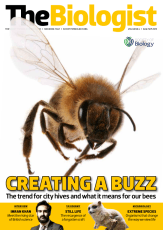Royal Society of Biology
 Official logo | |
| Abbreviation | RSB |
|---|---|
| Motto | Scientiam Vitae Propagare |
| Predecessor | Institute of Biology and the Biosciences Federation |
| Formation | 2009 |
| Type | Learned society and Professional association |
| Headquarters | London, UK |
| Location |
|
Membership | 16,000+ individual members |
Official language | English |
President | Jean Thomas |
| Mark Downs | |
| Website |
www |
Formerly called | Society of Biology |

The Royal Society of Biology (RSB), previously called the Society of Biology, is a learned society and professional association in the United Kingdom created to advance the interests of biology in academia, industry, education, and research. Formed in 2009 by the merger of the Biosciences Federation and the Institute of Biology, the society has around 16,000 individual members, and over 100 member organisations.[1] In addition to engaging the public on matters related to the life sciences, the society seeks to develop the profession and to guide the development of related policies.
Organisation
Members of the society are entitled to employ postnominal letters: AMRSB for associates, MRSB for members, and FRSB for fellows.[2]
The society is a member of the Science Council, and is licensed to award Chartered Scientist (CSci),[3] Registered Scientist (RSci), and Registered Science Technician (RSciTech) status to suitably qualified members. It is also able to award the status of Chartered Biologist (CBiol)[4] and Chartered Science Teacher (CSciTeach).
The Royal Society of Biology supports university students and early-career researchers with careers advice, travel grants and Life Sciences Careers Conferences. In 2012 it developed a Degree Accreditation Programme to promote high standards in the biosciences and highlight degrees which provide graduates with the skills required for academic and industry careers.[5]
The society has six Special Interest Groups: the Animal Science Group,[6] UK Biology Competitions,[7] Natural Capital Initiative,[8] the UK Plant Sciences Federation,[9] Biology Education Research Group and Heads of University Biosciences.[10]
A bi-monthly magazine The Biologist is produced by the Society.[11]
The society has a Royal Charter and is a registered charity. The first president of the society was Nancy Rothwell (University of Manchester)[12] and the current president is Jean Thomas.[13]
In May 2015 the society, previously called the Society of Biology, was granted permission to become the "Royal Society of Biology".[14]
Competitions
IThe Society runs two competitions for schools, the British Biology Olympiad and Biology Challenge, which are designed to challenge Britain's most talented students and reward them for their success.[15] The four winners of the British Biology Olympiad go forward to compete in the International Biology Olympiad.
Biology Week
The society organised the first ever Biology Week in 2012,[16] which is now an annual event.[17][18] It takes place in October and aims to inspire people of all ages and backgrounds with biology. It involves a series of events for scientists, schools, and members of the public.
Surveys
The society runs regular citizen science projects with the University of Gloucestershire.
Since 2012 it has been collecting records of flying ants as part of the Flying Ant Survey with Adam Hart.[19]
In 2013, they launched a House Spider Survey, also with Adam Hart, to collect reports of sightings of Tegenaria spiders using an app.[20]
In 2014 the society launched the Starling Murmuration Survey in order to help find out why starlings murmurate and thus inform research into why this species is in decline.[21]
The Biologist
 August 2013 cover | |
| Editor | Sue Nelson |
|---|---|
| Categories | Professional magazine |
| Frequency | Bimonthly |
| Year founded | 1953 |
| Company | Royal Society of Biology |
| Country | United Kingdom |
| Language | English |
| Website |
thebiologist |
| ISSN | 0006-3347 |
| OCLC number | 2240345 |
The Biologist is a bimonthly British professional magazine published by the Royal Society of Biology. The magazine was initially established by one of the two predecessor bodies, the Institute of Biology in 1953[22] and the editor-in-chief is Sue Nelson. The magazine is abstracted and indexed in several EBSCO databases, including full-text access through Academic Search Complete.[23]
References
- ↑ "Society of Biology membership grades". Society of Biology. Retrieved 11 November 2013.
- ↑ "Royal Society of Biology membership grades". Retrieved 11 November 2013.
- ↑ "Science Council". Retrieved 11 November 2013.
- ↑ "Chartered Status". Retrieved 11 November 2013.
- ↑ "Degree Accreditation". Retrieved 11 November 2013.
- ↑ "Animal Science Group". Retrieved 11 November 2013.
- ↑ "UK Biology Competitions". Retrieved 11 November 2013.
- ↑ "Natural Capital Initiative". Retrieved 11 November 2013.
- ↑ "UK Plant Sciences Federation". Retrieved 11 November 2013.
- ↑ "HUBS". Retrieved 11 November 2013.
- ↑ "HOME". Retrieved 29 October 2014.
- ↑ "Nancy Rothwell". Retrieved 29 October 2014.
- ↑ "Society officially welcomes new president". Retrieved 29 October 2014.
- ↑ "Society of Biology granted Royal title". Royal Society of Biology. 13 May 2015. Retrieved 3 December 2015.
- ↑ "Society of Biology competitions". Retrieved 22 May 2013.
- ↑ "Past Biology Weeks". Retrieved 29 October 2014.
- ↑ "Past Biology Weeks". Retrieved 29 October 2014.
- ↑ "Biology Week". Retrieved 29 October 2014.
- ↑ "Flying ant survey". Retrieved 29 October 2014.
- ↑ "Spider app". Retrieved 29 October 2014.
- ↑ "Starling survey". Retrieved 29 October 2014.
- ↑ "Biologist, Journal of the Institute of Biology". Catalogue. Library of Congress. Retrieved 2013-08-18.
- ↑ "Magazines and Journals". Academic Search Complete. EBSCO Publishing. Retrieved 2013-08-18.